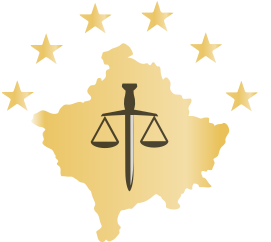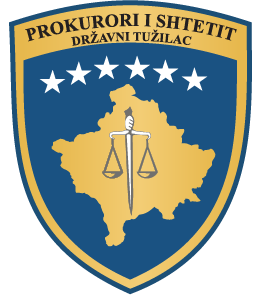









Criminal charges can be filed by: Kosovo Police or other law enforcers, institutions and citizens, by submitting the criminal report to one of the competent basic prosecutor's offices or to the Special Prosecution Office for cases in which it is competent.
Article 79 of the Criminal Procedure Code of Kosovo
Criminal report by persons
1. Every person has the right to report a criminal offense that is prosecuted ex officio and is obliged to do so in the event that non-escalation of the criminal offense is a criminal offense.
2. Social worker, health worker, teacher, educator or other persons performing similar work who learn or discover that there is a reasonable suspicion that the child is a victim of a criminal offense, especially for criminal offenses against sexual integrity, this should report it immediately.
3. When the prosecution for a certain criminal offense depends on the proposal to prosecute the injured party or on the prior permission of the competent body, the state prosecutor may not conduct the investigation, file the indictment without submitting evidence proving that the proposal or permit was granted. In urgent cases, the state prosecutor may act on the basis of an oral motion for prosecution which must be confirmed in writing within forty-eight (48) hours. The criminal report signed by the injured party is sufficient according to this paragraph.
Article 80 of the Criminal Procedure Code of Kosovo The
criminal report is submitted to the state prosecutor
1. The criminal report is submitted to the competent state prosecutor in writing, by technical means of communication or orally.
2. If the criminal offense has been reported orally, the person making the report shall be notified of the consequences of the false report. Minutes are compiled for oral criminal reports and official notification is made for telephone reports received by telephone or other means of communication.
3. The criminal report submitted to the court, police or state prosecutor that is not competent must be accepted and sent to the competent state prosecutor without delay.
CAUTION: According to Article 382 of the Criminal Code of the Republic of Kosovo, false reporting or reporting may be a criminal offense in the following cases:
Article 382 of the Criminal Code of the Republic of Kosovo
False notification or report
1. Anyone who makes a false notification to an official person charged with the duty to investigate or prosecute, that a certain person has committed a criminal offense which is prosecuted ex officio, while
knowing that such person is not the perpetrator, shall be punished by a fine or imprisonment of three (3) months to three (3) years.
2. Whoever provides false evidence for a criminal offense or in any other way causes the initiation of criminal proceedings for a criminal offense which is prosecuted ex officio against a person whom he considers not to have committed the criminal offense, shall be punished by a sentence of paragraph 1. of this article.
3. Whoever notifies himself that he has committed a criminal offense which is prosecuted ex officio, even though he has not committed such an offense, shall be punished by a fine or imprisonment of up to three (3) months.
4. Whoever notifies the official person charged with the duty to investigate or prosecute, that a criminal offense has been committed which is prosecuted ex officio, even though he knows that the offense has not been committed, shall be punished by the punishment referred to in paragraph 3. of this Article.
The mandate of the Chief State Prosecutor is also provided by Article 11 of the Law on the State Prosecutor and is as follows:
1. The Chief State Prosecutor:
1.1. is the head of the State Prosecutor's Office, responsible for the management and representation of the State Prosecutor's Office and the structures of the prosecution, which constitute the State Prosecutor's Office;
1.2. appoints the Deputy Chief State Prosecutor, from among the prosecutors in the Office of the Chief State Prosecutor, who replaces the Chief State Prosecutor in his absence;
1.3. has competence in the entire territory of the Republic of Kosovo;
1.4. has exclusive competence for third instance cases before the Supreme Court and above all cases involving extraordinary legal remedies;
1.5. issue in writing mandatory general rules, guidelines and decisions for all chief prosecutors and prosecutors in order to enforce legality, increase efficiency and uniquely implement practices and legislation;
1.6. supervises the implementation of the instructions and other acts defined in sub
- paragraph 1.5 of this article;
1.7. proposes to the Council for approval the rules on the activity and management of evidence in the prosecution;
1.8. performs other tasks defined by law.
2. For the purpose of efficient development of the procedure or for other important reasons, the Chief State Prosecutor on the basis of a written decision, may take under jurisdiction any case in any prosecutor in the Republic of Kosovo, or re-appoint him to a the other prosecutor. In addition to the elements mentioned, such a decision must justify at least the negligence, professional incompetence or conflict of interest of the prosecutor / s that make such a decision credible.
The competent authority to file a complaint for alleged disciplinary violations by prosecutors is; Chief State Prosecutor, Chief Prosecutors of any level and the Prosecutorial Council. Law on Disciplinary Responsibility of Judges and Prosecutors Article 9 Complaints against prosecutors for disciplinary violations; 1. Natural and legal persons may file a complaint against a judge or prosecutor regarding any allegation of disciplinary misconduct to the following authorities (hereinafter: “Competent Authority”): 1.1. The President of the Basic Court of Appeal in which the judge serves in respect of the allegations of disciplinary violations of that judge; 1.2. The President of the Supreme Court with regard to allegations of disciplinary violations by the Presidents of the Basic Courts and the President of the Court of Appeals; 1.3. Kosovo Judicial Council regarding allegations of disciplinary violations of the President of the Supreme Court; 1.4. The Chief State Prosecutor regarding allegations of disciplinary violations by the Chief Prosecutors; 1.5. The Chief Prosecutor regarding the allegations of disciplinary violations of prosecutors employed in the prosecution for which the Chief Prosecutor is responsible. 1.6. Kosovo Prosecutorial Council regarding allegations of disciplinary violations by the Chief State Prosecutor. 2. When the complaint is sent to the incompetent authority, such authority shall transfer the complaint to the competent authority, in accordance with the Law on General Administrative Procedure. 3. Natural and legal persons may file a complaint against a judge or prosecutor with the Ombudsman. 4. The natural or legal person must submit the complaint in writing. The complaint must contain: 4.1. the identity of the natural or legal person who lodges the complaint; 4.2. the identity of the judge or prosecutor who will be the subject of the investigation; 4.3. a concise description of the factual and legal aspects on which the suspicion of disciplinary violation has been raised . 5. Any official complaint must be registered and archived by the Competent Authority, which shall immediately send a written notice to the relevant Council regarding the acceptance of such a complaint . In case the People's Advocate receives a complaint, he must forward it to the Competent Authority specified in Article 9, paragraph 1, within five (5) working days. 6. The Competent Authority under Article 9 (1) shall examine the complaint within thirty (30) days from the date of receipt of the complaint and shall act in accordance with Article 12 (2), unless it finds that the complaint is manifestly unserious, unfounded. commit any disciplinary violation , or is statute-barred. Regarding the decision taken, the Competent Authority shall immediately notify in writing the person who has filed the complaint. A copy of the decision is also submitted to the relevant Council, and in the cases provided for in paragraph 3 of this Article, to the People's Advocate. 7. If the President of the Court or the Chief Prosecutor does not review and decide on the appeal or does not notify the person who filed the appeal on the grounds for dismissal of the appeal, as required in paragraph 6, they shall be deemed to have committed disciplinary violations.
The mandate of the Council derives from the Constitution and the law, which defines it as a fully independent institution in the exercise of its functions, in accordance with the law.
The Kosovo Prosecutorial Council provides equal access to justice for all persons in Kosovo.
The Kosovo Prosecutorial Council ensures that the State Prosecutor is independent, professional, impartial and reflects the multiethnic nature of Kosovo and the principles of gender equality.
The Council exercises the following duties and responsibilities:
The election and appointment of Council members is based on their high professional performance, moral reputation and personal integrity, ensuring a selection process based on the principles of competition, transparency, impartiality, objectivity, gender equality and multiethnicity.
The Council announces elections for prosecutorial members at least three (3) months before the end of the term of the existing members. The prosecutorial members of the Council are elected by secret ballot by the prosecutors of the respective prosecutions.
Candidates must not have been convicted of a criminal offense and have not had any disciplinary action in the last three years. The prosecutor who secures the most votes from the voting list will be elected a member of the KPC by the relevant prosecution.
The three (3) non-prosecutorial members of the Council, elected by the Assembly, according to Article 65 (10) of the Constitution, are elected by secret ballot, by a majority vote of the deputies present and voting, based on a list of two (2) candidates for each position proposed by the relevant bodies, which includes:
1. One (1) member from the Kosovo Chamber of Advocates;
2. One (1) professor from the law faculties of the Republic of Kosovo;
3. One (1) representative from civil society. The representative of the civil society is selected through a public competition announced by the Assembly, which must have high professional training, proven knowledge in the field of justice, knowledge in the field of human rights, work experience in legal matters of five ( 5) years and the support of at least five (5) civil society organizations in the field of justice.
The Council consists of thirteen (13) members, ten (10) of them prosecutors, three non-prosecutors. Council members remain in office for a term of five (5) years, without the right to be re-elected.
The council consists of:
The Council ensures that its composition reflects multiethnic nature and gender equality, ensuring that at least one member is from non-majority communities and at least three (3) members are female.
Decisions of the Council shall be taken by a simple majority of votes cast by the members present, unless otherwise provided by law. To make a decision, the Council needs a quorum, which is reached if nine (9) members attend the meeting. The members of the Council exercise their official duties independently and impartially and are not criminally liable for decisions, opinions and actions, within their scope as a member of the Council.
The Council from among its members prosecutors, by secret ballot, with 2/3 of the votes of the members present and voting, elects the Chairperson and the Deputy Chairperson, for a term of three (3) years. Election to these functions does not extend the term of office of a member of the Council.
The Chairman of the Council has the following authorizations:
The Chairman of the Council at least once a year presents annual public reports on the performance, actions, costs and budgetary needs of the prosecutorial system.
Organizes the procedure of electing the members of the standing committees according to this law, enabling the Council a transparent and responsible process of proposals and their appointment.
You can be elected a member of the KPC without being a prosecutor, because this is enabled by the Constitution and the Law on the Prosecutorial Council, because the Council must have three (3) non-prosecutor members, who are elected by the Assembly by secret ballot, according to Article 65 (10) of the Constitution, by a majority vote of the deputies present and voting, based on a list of two (2) candidates for each position proposed by the relevant bodies. This includes:
1. one (1) member from the Kosovo Chamber of Advocates;
2. one (1) professor from the law faculties of the Republic of Kosovo;
3. one (1) civil society representative. The representative of the civil society is selected through a public competition announced by the Assembly, which must have high professional training, proven knowledge in the field of justice, knowledge in the field of human rights, work experience in legal matters of five ( 5) years, and support of at least five (5) civil society organizations in the field of justice.
The process of filing and handling complaints against prosecutors is provided by Law no. 06 / L - 057 on disciplinary liability of judges and prosecutors and Regulation 05/2019 on disciplinary liability of prosecutors. The complaint is accepted by the competent authority or by the official authorized by this authority, in which case the competent authority shall immediately notify the Council in writing of the acceptance of the complaint. The competent authority shall review the complaint within 30 days. After undertaking the initial actions, the competent authority may file an appeal, reject it or request the initiation of investigations by the Council.
For disciplinary violations, the Council may impose on prosecutors one or more of the following disciplinary sanctions: